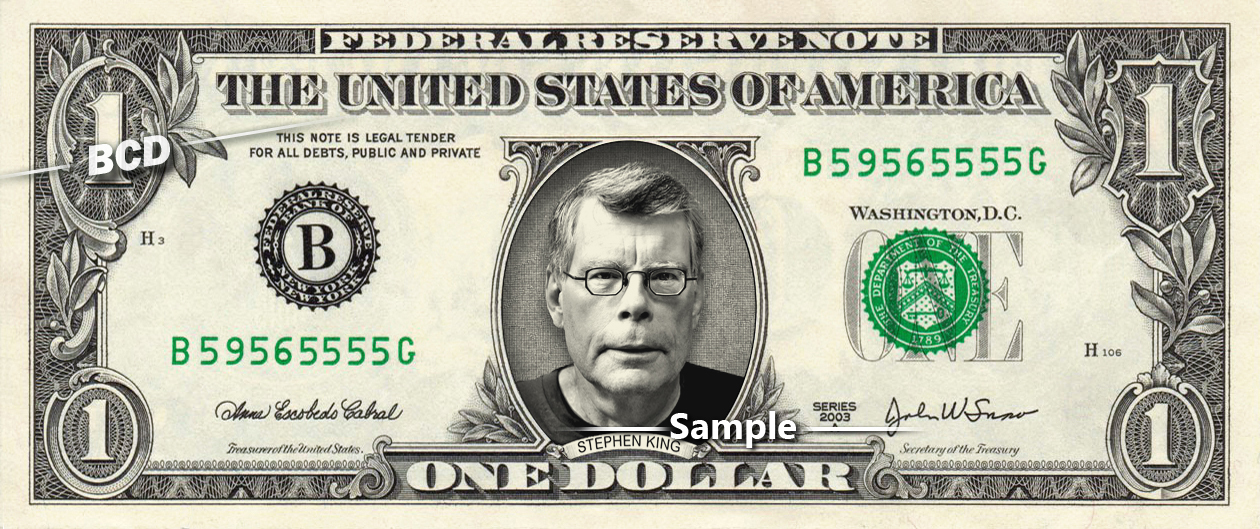 It was in 1977 that Stephen King proposed an interesting quasi-experiment: he elected to sell the movie rights to his stories to student filmmakers for the sum of one dollar, with the caveat that those filmmakers wouldn’t be allowed to profit off the resulting films (because, apparently, if King isn’t making any money off them then nobody else can either). As of 2021 the program is still going strong.
It was in 1977 that Stephen King proposed an interesting quasi-experiment: he elected to sell the movie rights to his stories to student filmmakers for the sum of one dollar, with the caveat that those filmmakers wouldn’t be allowed to profit off the resulting films (because, apparently, if King isn’t making any money off them then nobody else can either). As of 2021 the program is still going strong.
…apparently, if King isn’t making any money off them then nobody else can either
A pair of those so-called Dollar Baby films, Jeff Schiro’s THE BOOGEYMAN (1982) and Frank Darabont’s THE WOMAN IN THE ROOM (1984), were released on VHS in the eighties under the title STEPHEN KING’S NIGHT SHIFT (from which, according to Darabont, neither filmmaker “made a dime”). A third, John Woodward’s DISCIPLES OF THE CROW (1983), was released as part of a second STEPHEN KING’S NIGHT SHIFT VHS (together with a non-King affiliated short entitled THE NIGHT WAITER). Otherwise, though, public distribution of these films has been scant. Home video and internet streaming are off the table, with the only way of viewing Dollar Babies being the infrequent Dollar Baby Film Festivals. The latest such festival was a glitch-laden online event from Canada’s Barker Street Cinema that took place on YouTube and Vimeo from April 23 to 25, 2021, and screened well-known Dollar Babies like THE BOOGEYMAN, THE WOMAN IN THE ROOM, the infamous SURVIVOR TYPE (2012) and the multi-award winning THE DOCTOR’S CASE (2018).
For further background see the texts THE DOLLAR BABY: REVIEWS AND INTERVIEWS (2020) by Steve Hutchison and DOLLAR BABY: THE BOOK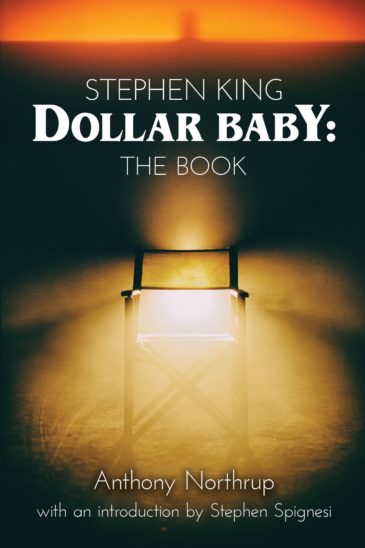 (2021) by Anthony Northrup. The latter, a 620 page doorstop, is definitely the one to read, even though it’s loaded with hasty prose, typos and not-very insightful insights. It also paints an admirably thorough picture of the Dollar Baby phenomenon, with numerous essays, filmmaker interviews, reviews (marked by verbiage like “I recommend anyone who can get to a film fest near you to see this film and enjoy yet another Dollar Baby hit!”) and a great deal of historical and procedural info. In short, the book is a must-read for anyone with a rooting interest in the subject, even if its particulars leave something to be desired.
(2021) by Anthony Northrup. The latter, a 620 page doorstop, is definitely the one to read, even though it’s loaded with hasty prose, typos and not-very insightful insights. It also paints an admirably thorough picture of the Dollar Baby phenomenon, with numerous essays, filmmaker interviews, reviews (marked by verbiage like “I recommend anyone who can get to a film fest near you to see this film and enjoy yet another Dollar Baby hit!”) and a great deal of historical and procedural info. In short, the book is a must-read for anyone with a rooting interest in the subject, even if its particulars leave something to be desired.
Dollar Baby films tend to include homages to their originator in the form of assorted “Easter Eggs” for fans (a character named “Dufresne,” the address “1408,” a throwaway line about “Captain Trips,” etc.) and highly literal, non-ironic takes on the source texts. I have yet to come across a CARRIE (1976) or THE SHINING (1980) in the Dollar Baby ranks, i.e. an auteur-driven film that both compliments and transcends its source (yes, I know THE SHINING is a controversial choice in that category, but I say it’s a just one), with the closest thing to such a film, in my view, being SURVIVOR TYPE.
It was adapted by writer-director Billy Hanson from King’s most infamous tale, about a starving surgeon’s desperate attempt to survive on a deserted island, conveyed through a video diary the guy makes (in place of the written diary of the story). That surgeon is played quite brilliantly by Gideon Emery, whose arc, from haughty professionalism to raw insanity, is flawlessly rendered, with the found footage format conveying that transformation extremely well.
I also strongly recommend THE DOCTOR’S CASE. Directed by James Douglas and Norm Coyne, it was adapted from King’s similarly titled 1987 Sherlock Holmes pastiche. Running 65 minutes, it’s marked by sumptuous Victorian-era design, a skilled and distinct cast and bravura filmmaking (the wizardly tracking shot that opens the film is a mind-blower). Ian Holm lookalike J.P. Winslow plays an elderly Sherlock Holmes and William D. Davis is Watson, supported by, among others, PET SEMATARY’S Denise Crosby (surely one of the biggest-ever gets in Dollar Baby history).
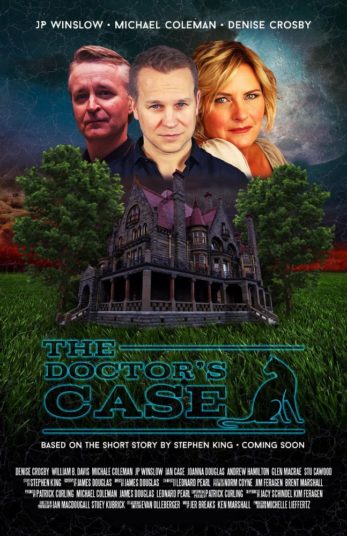 The film is closest to, if anything, Bob Clark’s MURDER BY DECREE (1979)—and I say that’s high praise. It’s a bit talky for my tastes, but otherwise there’s really nothing in THE DOCTOR’S CASE for me to complain about.
The film is closest to, if anything, Bob Clark’s MURDER BY DECREE (1979)—and I say that’s high praise. It’s a bit talky for my tastes, but otherwise there’s really nothing in THE DOCTOR’S CASE for me to complain about.
I’ll also have to give a nod to the British made black and white VINTON’S LOT (2019). One of the most artful Dollar Babies, it was adapted from King’s 2008 story “A Very Tight Place” by Jamie Matthew Dearden, who provides roving camerawork through the protagonist’s scenic house, heavy voice-over recitations and a muted harmonica score in what begins as a horrific stalking drama but ends up a most eccentric love story.
In further exploring the Dollar Baby universe I’ll go back to the beginning: to THE BOOGEYMAN, which is often credited as the first Dollar Baby Film. Its source was a 1973 King story about a man who may or may not be insane after (it appears) he’s murdered his children. Director Jeff Schiro evinces a good eye for composition, and the intercutting between the psychiatric sessions that frame the film and the protagonist’s recollections of the killings in question is accomplished with a great deal of macabre flair. My biggest problem was with the soundtrack, which is filled with groaning and wailing instruments that grow old very quickly.
THE WOMAN IN THE ROOM, the officially designated second Dollar Baby, was adapted from one of King’s most poignant and least horrific stories. Based on King’s own experiences with a dying relative, it features a lawyer attending to his ailing mother in a hospital room, eventually putting her out of her misery by feeding her a ton of sleeping pills. The youthful Frank Darabont does good job adapting this tale, adding a horrific dream sequence and an elaborate subplot about a prisoner client with whom the protagonist chats (thus justifying the claim that Darabont’s filmography consists primarily of Stephen King prison movies). The film may ultimately be a bit too staid and controlled, but it’s still far above average.
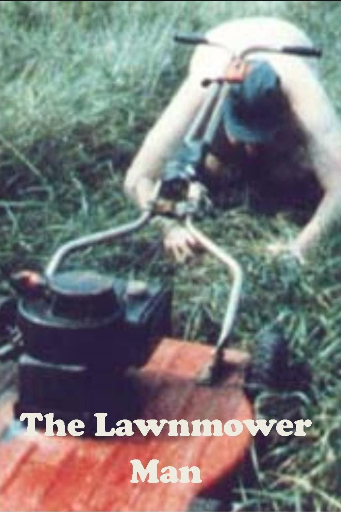 Rounding out the original “fearsome four” Dollar Baby films are James Cole and Dan Thron’s THE LAST RUNG ON THE LADDER and Jim Gonis’s THE LAWNMOWER MAN, both of which hail from 1987. The former was adapted from another of King’s poignant non-horror tales, about a grief-stricken man’s unsettled mental state in the wake of his sister’s suicide. The film is a faithful adaptation with excellent performances by its child actors, but its approach is distractingly amateurish; I understand that first timer pratfalls are inevitable in Dollar Baby films, but THE LAST RUNG ON THE LADDER far exceeds the acceptable quota. THE LAWNMOWER MAN (not included in the 2021 festival but easily findable online) is just as clumsy, but it’s also more fun. Adapted from one of King’s nuttier tales, and Marvel Comics’ BIZARRE ADVENTURES adaptation of same, the film is an unabashedly silly, over-the-top spectacle about a mutant lawnmower man and a self-driving mower (it is not to be confused with the 1992 film of the same name, which was an in-name-only adaptation).
Rounding out the original “fearsome four” Dollar Baby films are James Cole and Dan Thron’s THE LAST RUNG ON THE LADDER and Jim Gonis’s THE LAWNMOWER MAN, both of which hail from 1987. The former was adapted from another of King’s poignant non-horror tales, about a grief-stricken man’s unsettled mental state in the wake of his sister’s suicide. The film is a faithful adaptation with excellent performances by its child actors, but its approach is distractingly amateurish; I understand that first timer pratfalls are inevitable in Dollar Baby films, but THE LAST RUNG ON THE LADDER far exceeds the acceptable quota. THE LAWNMOWER MAN (not included in the 2021 festival but easily findable online) is just as clumsy, but it’s also more fun. Adapted from one of King’s nuttier tales, and Marvel Comics’ BIZARRE ADVENTURES adaptation of same, the film is an unabashedly silly, over-the-top spectacle about a mutant lawnmower man and a self-driving mower (it is not to be confused with the 1992 film of the same name, which was an in-name-only adaptation).
The outlier here is DISCIPLES OF THE CROW, which seems to have been forgotten by nearly everyone. Adapted from “Children of the Corn,” it’s much better than the similarly titled movie franchise, with highly atmospheric visuals and sound design that nearly offset the silliness of the narrative, about kids in a small Midwestern community who kill all the grown-ups. The brats end up presiding over a seeming ghost town, encountered by a bickering couple on an ill-advised drive through the area.
From there interest in taking King up on his one dollar offer appears to have stagnated (in the pre-internet era information about the program was hard to come by), only to pick up in the 00s and ‘10s. Now we’re into the 2020s, and the Dollar Baby program has all-but exploded.
PARANOID: A CHANT (2000) is a strong, if overly brief, depiction of insanity, adapted from King’s poem of the same name. It depicts a young woman (Tonya Ivey) in a hotel room undergoing a psychotic breakdown, assailed by flashbacks and hallucinations that for all the viewer knows may be one and the same.
The 34 minute GRAY MATTER (2017) is an extremely well lensed film, courtesy of director Red Clark. It features indie film legend Larry Fessenden as a redneck sewer worker who, after encountering a spider-creature, becomes an inhuman critter. As in the story there’s nothing too deep or profound, but as grade-B monster movie fun decked out with practical (as opposed to CGI) monster/mutation effects GRAY MATTER succeeds admirably.
Of REST STOP (2019) by Joshua Lozano, adapted from King’s similarly titled 2008 story, at least half its 36 minute runtime is taken up with developing the lead character, a frustrated writer who enters into a very DARK HALF-esque psychological conundrum. I prefer Alexander Bruckner’s THE PASSENGER 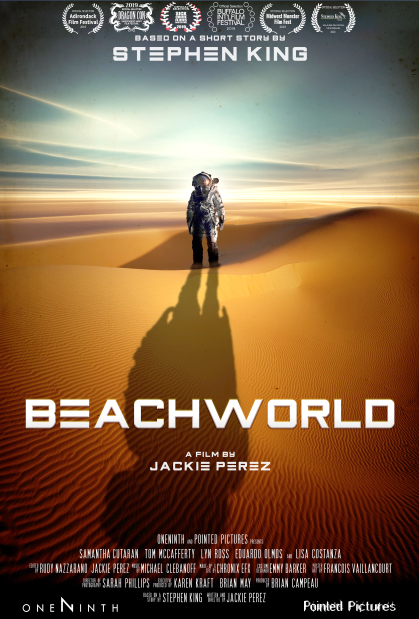 (2020), a more faithful and less affected take on the same story. It follows two friends who happen upon a woman being abused in a rest stop bathroom, and observes how each handles the situation (although the whole thing drags on a bit too long).
(2020), a more faithful and less affected take on the same story. It follows two friends who happen upon a woman being abused in a rest stop bathroom, and observes how each handles the situation (although the whole thing drags on a bit too long).
The BEACHWORLD adaptation shown at the 2021 festival was made by director Jackie Perez in 2019. This means it’s not the most acclaimed version of the story, which happens to be a 2013 animated short by Russian filmmaker Maria Ivanova.
Regarding Perez’s film, it’s well lensed but leaves out the story’s quirkier elements. An example would be the frequent Beach Boys references, which make sense given that the story involves cosmonauts stuck on a planet comprised entirely of sand dunes, but the Beach Boys (due doubtless to rights issues) aren’t found here. Nor are overtly surreal touches like the sand hands that turned up near the end of the story, leaving us with a could-have-been-better film.
UNCLE OTTO’S TRUCK (2019) is an assured period piece. Writer-director Brian Johnson adds some ingenious touches to King’s story about a redneck who kills his nephew in a faux-accident, only to be done in himself, apparently by guilt. The killing is proven by home movie footage taken by a young boy who witnesses the crime.
ONE FOR THE ROAD (2020), written and directed by Joseph Horning, is based on Stephen King’s 1977 vampire-themed story, a sequel of sorts to SALEM’S LOT. At 43 minutes it’s one of the longer Dollar Babies, and also one of the slicker ones, with elaborate and professional lighting and solid (for the most part) performances. Such a high degree of competence, alas, is offset by B-movie elements like glowing eyes and an overly insistent music score (although I quite liked the selections from Ralph Vaughn Williams’ ANTARCTICA played near the end).
MUTE (2020) was made by Rob Darren. Running 28 minutes, it’s about a guy on a drive through the desert who picks up a fellow claiming to be deaf and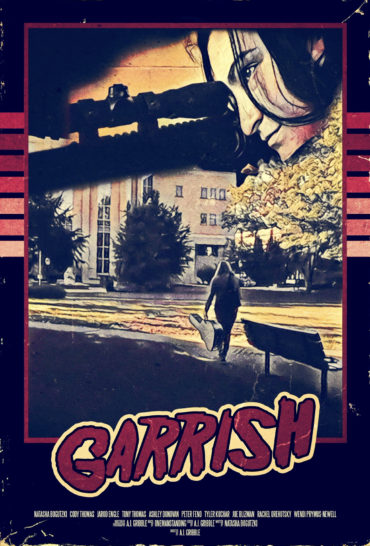 mute—and so he doesn’t respond when the protagonist takes to bitching about his wife’s infidelities, only to have her and her lover turn up dead, and the hitchhiker disappear. Could the latter be responsible for the killings? A diverting enough film, dedicated to the late grade-Z moviemaker Ted V. Mikels, “Filmmaker, Mentor and Friend”
mute—and so he doesn’t respond when the protagonist takes to bitching about his wife’s infidelities, only to have her and her lover turn up dead, and the hitchhiker disappear. Could the latter be responsible for the killings? A diverting enough film, dedicated to the late grade-Z moviemaker Ted V. Mikels, “Filmmaker, Mentor and Friend”
L.T.’s THEORY OF PETS (2019) is a comedic ditty about a married couple using their pets as ammunition against each other, with lots of animal POV shots. It’s about as well made as possible, but hampered by the fact that the story, with its out-of-left-field horrific twist, is simply not one of King’s better works.
DEDICATION (2019), which had its world premiere at the 2021 virtual festival, was adapted from one of King’s most controversial stories. It concerns a pregnant house maid’s black magic-tinged encounter with a famous novelist. Writer-director Selina Sondermann has created a visually dazzling, brilliantly performed (by lead actress Raquel Villar) but remote and rather disjointed adaptation, marred by the fact that, as Sondermann admits in her post film Q&A, she didn’t entirely connect with the story.
GRADUATION AFTERNOON (2021) isn’t much. It was adapted from one of King’s more perfunctory tales, about a young woman meeting her boyfriend’s rich family in their swanky home, where she plans to announce that she’s pregnant—only to be interrupted by “political bullshit” emerging from the world outside this hermetic reality. Director Rob Padilla Jr. spices the story with 2020 political allusions, such as a TV speech by Donald Trump and a conversation about “this terrorism thing.” Otherwise, though, the film isn’t very invigorating.
GARRISH (2020) is a 55 minute original from director A.J. Gribble, of course, had previously adapted King’s Charles Whitman inspired “Cain Rose Up” in 2018 (which wasn’t included in the 2021 festival). GARRISH, filmed on an iPhone 7 camera with extremely wide lenses, functions as both a gender-reversed rethink of the original story, with a young woman embarking on a shooting rampage from her college dorm room in place of the young man of the original, and a prequel to same, showing us why this person got so riled up. She was sexually assaulted, to be exact, thus turning a markedly disturbing and ambiguous account into a simple revenge tale. Not good!
